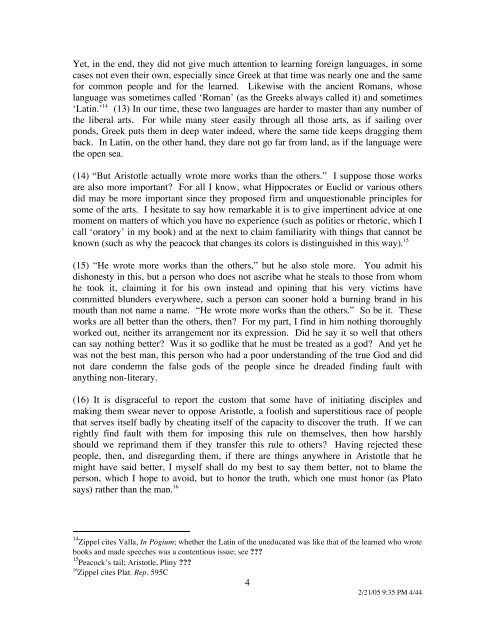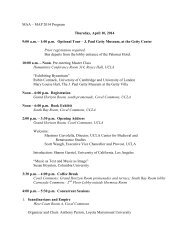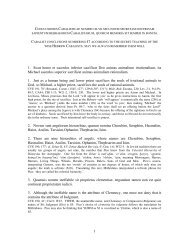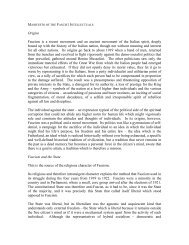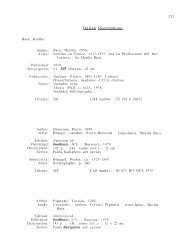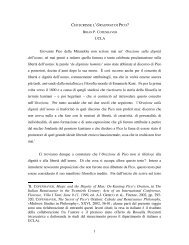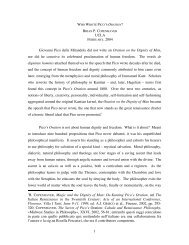1 (1) Pythagoras of Samos instructed the region of Italy once called ...
1 (1) Pythagoras of Samos instructed the region of Italy once called ...
1 (1) Pythagoras of Samos instructed the region of Italy once called ...
Create successful ePaper yourself
Turn your PDF publications into a flip-book with our unique Google optimized e-Paper software.
Yet, in <strong>the</strong> end, <strong>the</strong>y did not give much attention to learning foreign languages, in some<br />
cases not even <strong>the</strong>ir own, especially since Greek at that time was nearly one and <strong>the</strong> same<br />
for common people and for <strong>the</strong> learned. Likewise with <strong>the</strong> ancient Romans, whose<br />
language was sometimes <strong>called</strong> ‘Roman’ (as <strong>the</strong> Greeks always <strong>called</strong> it) and sometimes<br />
‘Latin.’ 14 (13) In our time, <strong>the</strong>se two languages are harder to master than any number <strong>of</strong><br />
<strong>the</strong> liberal arts. For while many steer easily through all those arts, as if sailing over<br />
ponds, Greek puts <strong>the</strong>m in deep water indeed, where <strong>the</strong> same tide keeps dragging <strong>the</strong>m<br />
back. In Latin, on <strong>the</strong> o<strong>the</strong>r hand, <strong>the</strong>y dare not go far from land, as if <strong>the</strong> language were<br />
<strong>the</strong> open sea.<br />
(14) “But Aristotle actually wrote more works than <strong>the</strong> o<strong>the</strong>rs.” I suppose those works<br />
are also more important? For all I know, what Hippocrates or Euclid or various o<strong>the</strong>rs<br />
did may be more important since <strong>the</strong>y proposed firm and unquestionable principles for<br />
some <strong>of</strong> <strong>the</strong> arts. I hesitate to say how remarkable it is to give impertinent advice at one<br />
moment on matters <strong>of</strong> which you have no experience (such as politics or rhetoric, which I<br />
call ‘oratory’ in my book) and at <strong>the</strong> next to claim familiarity with things that cannot be<br />
known (such as why <strong>the</strong> peacock that changes its colors is distinguished in this way). 15<br />
(15) “He wrote more works than <strong>the</strong> o<strong>the</strong>rs,” but he also stole more. You admit his<br />
dishonesty in this, but a person who does not ascribe what he steals to those from whom<br />
he took it, claiming it for his own instead and opining that his very victims have<br />
committed blunders everywhere, such a person can sooner hold a burning brand in his<br />
mouth than not name a name. “He wrote more works than <strong>the</strong> o<strong>the</strong>rs.” So be it. These<br />
works are all better than <strong>the</strong> o<strong>the</strong>rs, <strong>the</strong>n? For my part, I find in him nothing thoroughly<br />
worked out, nei<strong>the</strong>r its arrangement nor its expression. Did he say it so well that o<strong>the</strong>rs<br />
can say nothing better? Was it so godlike that he must be treated as a god? And yet he<br />
was not <strong>the</strong> best man, this person who had a poor understanding <strong>of</strong> <strong>the</strong> true God and did<br />
not dare condemn <strong>the</strong> false gods <strong>of</strong> <strong>the</strong> people since he dreaded finding fault with<br />
anything non-literary.<br />
(16) It is disgraceful to report <strong>the</strong> custom that some have <strong>of</strong> initiating disciples and<br />
making <strong>the</strong>m swear never to oppose Aristotle, a foolish and superstitious race <strong>of</strong> people<br />
that serves itself badly by cheating itself <strong>of</strong> <strong>the</strong> capacity to discover <strong>the</strong> truth. If we can<br />
rightly find fault with <strong>the</strong>m for imposing this rule on <strong>the</strong>mselves, <strong>the</strong>n how harshly<br />
should we reprimand <strong>the</strong>m if <strong>the</strong>y transfer this rule to o<strong>the</strong>rs? Having rejected <strong>the</strong>se<br />
people, <strong>the</strong>n, and disregarding <strong>the</strong>m, if <strong>the</strong>re are things anywhere in Aristotle that he<br />
might have said better, I myself shall do my best to say <strong>the</strong>m better, not to blame <strong>the</strong><br />
person, which I hope to avoid, but to honor <strong>the</strong> truth, which one must honor (as Plato<br />
says) ra<strong>the</strong>r than <strong>the</strong> man. 16<br />
14 Zippel cites Valla, In Pogium; whe<strong>the</strong>r <strong>the</strong> Latin <strong>of</strong> <strong>the</strong> uneducated was like that <strong>of</strong> <strong>the</strong> learned who wrote<br />
books and made speeches was a contentious issue; see ???<br />
15 Peacock’s tail; Aristotle, Pliny ???<br />
16 Zippel cites Plat. Rep. 595C<br />
4<br />
2/21/05 9:35 PM 4/44


